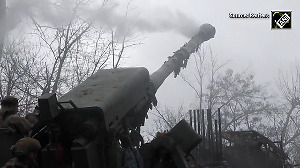Terming as a "watershed" event the killing of Osama bin Laden by the United States in Pakistan, Defence minister A K Antony on Friday said it will have a "ripple effect" in the India's "strategic neighbourhood" and asked the Armed Forces to be prepared for any eventuality.
Meeting top commanders of the Armed Forces who took stock of the situation in the region, he observed that China continued to be the strategic partner of Pakistan despite the latter's position being "internationally stamped" as core of terrorist activities in the region.
Antony told the Unified Commanders Conference that the security situation in Pakistan continues to be a cause for concern. He asked the top brass of the Armed Forces to continuously assess the security situation in "our strategic neighbourhood" in the aftermath of the elimination of Bin Laden and "remain prepared for any eventuality".
The US operation in Pakistan was "a watershed in the global war on terror", Antony said adding "the ripples of this event will have wide ranging impact on our strategic neighbourhood."
He said the fact that bin Laden was found in Abbottabad, deep inside Pakistan, has "internationally stamped Pakistan's position as the core of terrorist activities in the region".
Maintaining that India always desires friendly relations with all its neighbours, the defence minister said Pakistan must take concrete action to dismantle terrorist infrastructure on its soil if any real progress was to be made in improving bilateral relations.
He said he was not unduly concerned over China's moves to modernise and upgrade its military capability but "We must on our part, keep up the ongoing process of upgrading our military structure".
He expressed the hope that progress will be made in discussion with China on border dispute. On the situation in Jammu and Kashmir, Antony said it has shown improvement over the past few months.
The violence level has declined and the political processes have come to the forefront due, in a large measure, to the sustained efforts of the security forces, he said. However, the Armed Forces need to keep up the vigil to ensure that the levels of violence were kept to the minimum.
"This calls for a lot of restraint and upholding the human rights of the local people, without compromising all our preparedness to meet any evil designs," he said adding that the summer months will be a crucial test of the response mechanism.
On the issue of shortage of officers, he said an additional squadron was being raised which will have a capacity of 120 cadets. The total authorised capacity of National Defence Academy would be enhanced from 1,800 to 1,920 cadets, he said.






 © 2025
© 2025